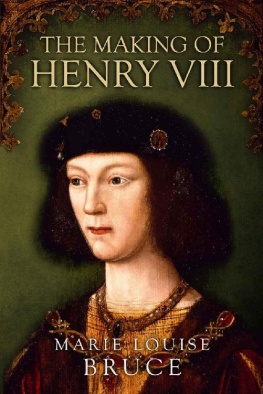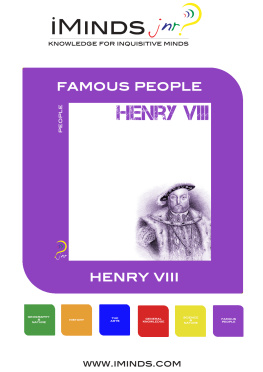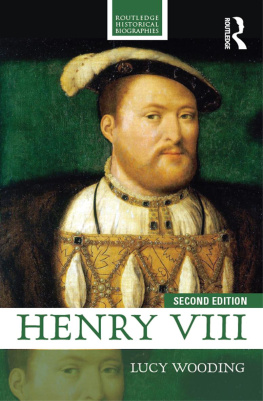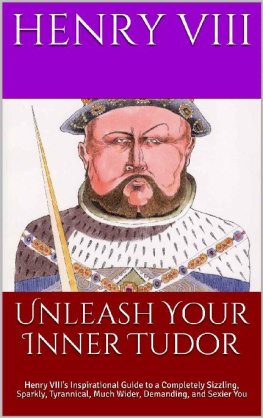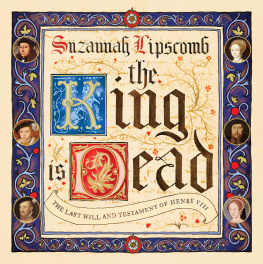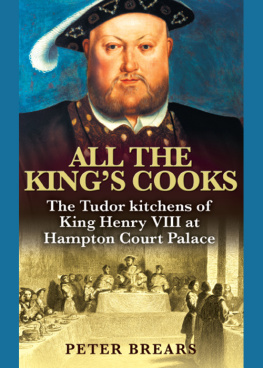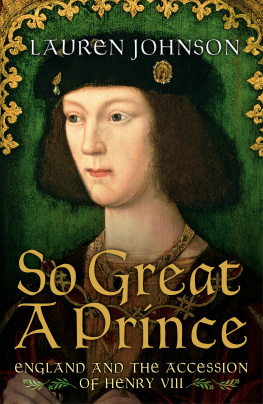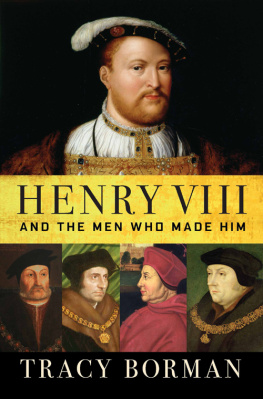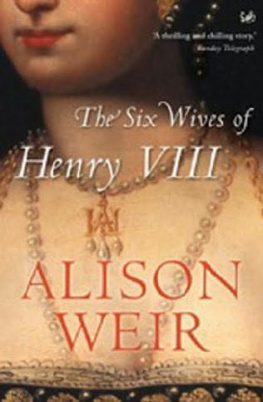THE MAKING OF HENRY VIII
Marie Louise Bruce

TABLE OF CONTENTS
PROLOGUE
When Henry VIII came to the throne contemporaries greeted the event as the dawn of a new and glorious age. The seventeen-year-old king was marvellously handsome, sweet-tempered, idealistic, religious, a patron of learning, a lover of peace, our divine prince. Oh, my Erasmus, Lord Mountjoy wrote in Latin to the famous scholar, if you could see how all the world here is rejoicing in the possession of so great a prince, how his life is all their desire, you could not contain your tears for joy. The heavens laugh, the earth exults, all things are full of milk, of honey and of nectar! Avarice is expelled the country. Liberality scatters wealth with bounteous hand. Our king does not desire gold or gems or precious metals, but virtue, glory, immortality. I will give you an example. The other day he wished he was more learned. I said, That is not what we expect of your Grace, but that you will foster and encourage learned men. Yea surely, said he, for indeed without them we should scarcely exist at all.
On his death thirty-seven years later, Henry left behind a sharply contrasting record, one of selfishness, greed and brutality unrivalled by any other English monarch. And at the beginning of the seventeenth century Sir Walter Ralegh wrote: If all the pictures and patterns of a merciless prince were lost in the world, they might all again be painted to the life out of the story of this king. Posteritys view of his character has not altered much since. Five of the men and women who had been closest to Henry he had sent to their deaths; he had promised clemency to the leaders of rebellion, only to have one of them die in the most lingering and humiliating way conceivable even by sixteenth-century man.
The images that the name Henry VIII conjures up in the modern mind are mostly horrific, if picturesque. In place of the angelic youth one sees the small, hard, suspicious eyes, hears the oddly high voice quoting Machiavelli, If my cap knew my counsel I would throw it in the fire. One sees him galloping with a great sword incognito through the night to watch a farce of himself decapitating monks right and left, a spectacle that made him laugh so heartily that he was discovered. One sees the megalomaniac who broke with Rome to make himself Caesar-Pope of England, a severance which, though generally popular in the kingdom, came at the time it did for an extraordinary reason: so that the king could rid himself of one wife and marry another in the hope of thus obtaining a male heir to the throne. It was an act that put England at serious risk of invasion, which would eventually come in 1588 in the shape of the Armada.
One sees the man who dissolved the monasteries on such a vast scale that he changed the face of England a man who had at the same time the temerity to rewrite the Lords Prayer, and who convinced himself that he was the special favourite of God. But, above all, the name Henry VIII brings to mind the victims of his cruelty: Catherine of Aragon, divorced from bed and board and threatened with execution; Anne Boleyn, executed as the result of a far-fetched plot; Katherine Howard, beheaded for adulterous intention; Cromwell and Wolsey dying on the block and on the way to the block, Sir Thomas More cracking jokes on the scaffold steps, Cardinal Fishers head turning miraculously ruddy on London Bridge, Robert Aske suspended in chains above the city until he died; and the old countess of Salisbury who survived to experience a second stroke of the axe. These are his best-known victims, but there were many more.
What caused this incredible transformation from angelic youth to middle-aged monster? The blow on the head at a joust at the age of forty-five, which caused him to lie unconscious for two hours? Or the reputed onset of syphilis, whose symptom was an ulcerated leg? The most recent medical view is that the head injury did no lasting damage, and that Henry never contracted syphilis. As Sir Arthur MacNalty points out in Henry VIII: A Difficult Patient , had he caught this disease, then new to England, and been treated for it, ambassadors at his court could not have failed to notice, since a course of treatment was both drastic and unpleasant. It lasted for six weeks and consisted of sweating and the administration of mercury, until the gums became sore and there was a copious flow of saliva. Furthermore Henry throughout his life showed no other sign of syphilis. There is no mention of swellings on the bones, syphilitic inflammation of the arteries or general paralysis or locomotor ataxia, or defects of vision.
MacNalty estimated that the disease from which Henry began to suffer in 1528 could have been either a varicose ulcer or osteomyelitis, which complaint could only exacerbate characteristics that were already present, unlike syphilis which affects the brain. So there was no radical change at all; characteristics prominent in middle age were latent in the golden youth.
Most biographies of Henry VIII begin, to all intents and purposes, with the start of his reign, but the real story begins earlier. At seventeen his character was no blank page. The invisible writing was already there, the habits of thought and behaviour imprinted by the experiences of childhood. And, I believe, it is into the last seventeen years of the fathers reign that we must look for the hidden springs of the sons actions not merely the inhumanities, but his political insights and skills, his talents and fears and failings, his personal relationships. All these things, I believe, can only be wholly explained by an examination of his childhood, the domestic details of his life in his fathers palaces and the people who shared it, the lessons of his times and surroundings. But before examining the influences that were to mould the growing boy , it is necessary to look at the clay they had to work on: Henrys heredity.
CHAPTER 1: THE SOVEREIGN SEED
Beholde the soveren sede of this rosis twayn,
Renewde of God for owre consolacion.
Fayrfax MS
Henry Tudor the future Henry VIII was born on 28 June 1491 in the palace of Placentia at Greenwich in a room where tapestry muffled the windows to exclude even the smallest breath of fresh air. Soon after the midwife had bathed him, anointed him with olive oil and sprinkled him with rose water, he was swaddled in blue velvet and cloth-of-gold and laid in the great cradle of estate. In this impressive piece of nursery furniture, five-and-a-half feet long and two-and-a-half feet wide, decorated with the royal coat of arms, he was proudly put on display to courtiers and ambassadors . But although thus made into a splendid spectacle, little of the person that he really was could be seen, apart from his fair skin and perhaps a down of auburn hair; like all babies, he was a mystery. The latent Roman nose had as yet not even a bridge, the long chin was still hidden in the indefinite contours of infancy, and with it, all the other physical, mental and emotional characteristics that he had inherited.
Henrys ancestors were an international and remarkable collection. They had intermarried with French and Spanish royal families, and they included, as well as the Welsh Tudors descended from a first cousin of the notorious rebel Owen Glendower such exceptionally capable and determined kings as William the Conqueror himself, Henry II, Edward I and Edward III. But of all his forebears he had inherited most from his maternal grandfather, Edward IV.
At the age of only nineteen, Edward had marched on London, attacked and beaten the armies of Henry VI and his queen, Margaret of Anjou, and claimed the crown of England. He had retained it for the rest of his life, except for a period of six months when Henry VI was briefly restored to the throne by the rebel earl of Warwick, and Edwards younger brother, the duke of Clarence. Edward had not only put down the rebellion, he had also succeeded in solving the problem that had bedevilled his predecessors: how to reorganize the royal finances so that the king could live of his own instead of depending on extra taxes demanded from his unwilling subjects. The baby Henry in the great cradle of estate was not only to inherit Edward IVs drive and ability, but also his extrovert charm and impressive physique. Like his grandfather, he would appear to contemporaries of visage lovely, of body mighty, strong and clean made, and like his grandfather, he would be greedy and grow eventually very fat in middle age.
Next page
